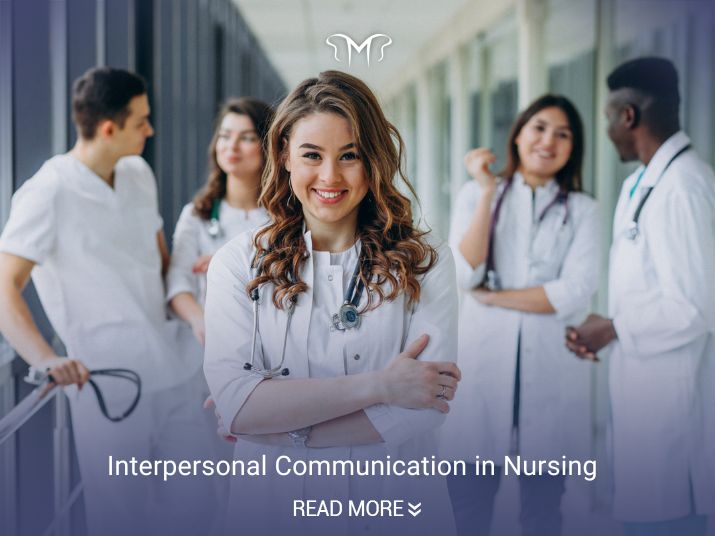
Foundations of Interpersonal Communication in Nursing
In this crucial aspect of nursing, establishing strong foundations for interpersonal communication is paramount. Let's delve into the significance of this skill and explore how building trust and rapport plays a pivotal role in nursing practice.
Understanding the Importance of Interpersonal Communication in Nursing
Interpersonal communication is the backbone of effective nursing care. It goes beyond mere exchanges of information, encompassing empathy, active listening, and cultural competence. Understanding why this aspect is so vital sets the stage for creating meaningful connections with patients and colleagues.
Building Trust and Rapport
Trust is the bedrock of any patient-nurse relationship. We'll explore the strategies and nuances of building trust, ensuring that patients feel secure and confident in their healthcare journey. Additionally, establishing rapport contributes to a positive environment, fostering better communication and ultimately enhancing the overall quality of care.
By delving into these foundational elements, we can grasp the essence of interpersonal communication in nursing and appreciate its profound impact on patient outcomes and the healthcare experience.
Building Strong Connections: Interpersonal Communication in Nursing
1. Understanding the Heart of Nursing Communication
- Unveiling the Significance of Interpersonal Communication
- Crafting Trustworthy Relationships: The Foundation of Nursing Connections
2. Nurturing the Art of Connection: Essential Communication Skills for Nurses
- Tuning In: The Power of Active Listening in Nursing Conversations
- Beyond Words: Embracing Empathy and Compassion in Nursing Interactions
- Speaking Volumes Without Words: The Language of Nonverbal Communication in Nursing
3. Putting Patients First: Patient-Centered Communication in Nursing
- Taloring the Talk: Adapting Communication to Patient Needs
- Embracing Diversity: Cultural Competence as a Cornerstone of Nursing Communication
4. Strategies that Speak Louder: Communication Strategies in Nursing Practice
- Harmony in the Team: The Symphony of Team Communication in Nursing
- Navigating Stormy Seas: Conflict Resolution in the Nursing Environment
- Navigating Tough Talks: Mastering Difficult Conversations in Nursing
5. Tech Talk: Technology and Communication in Nursing
- Electronic Dialogues: Unveiling the Role of Electronic Health Records in Nursing Communication
- Beyond Boundaries: Exploring Telehealth and Its Impact on Nursing Communication
6. Overcoming Obstacles: Communication Challenges and Solutions in Nursing
- Breaking Down Barriers: Identifying and Addressing Communication Obstacles
- Bridging Gaps: Strategies for Overcoming Common Communication Challenges in Nursing
7. Educate to Empower: Patient Education and Health Promotion through Nursing Communication
- Beyond Diagnosis: The Art of Effective Health Communication in Nursing
- Conversations that Catalyze Change: Motivational Interviewing in Nursing Practice
8. The Ethical Echo: Legal and Ethical Considerations in Interpersonal Communication in Nursing
- Behind Closed Doors: Maintaining Patient Confidentiality in Nursing Communication
- Informed and Aligned: Navigating Legal and Ethical Dimensions in Nursing Communication
9. Growing Together: Continuing Education in Interpersonal Communication for Nurses
- Lifelong Learners: Professional Development Opportunities for Nursing Communication
- Staying in Sync: Riding the Waves of Communication Trends in Nursing
10. Measuring the Heartbeat: Assessing and Enhancing Communication Competency in Nursing
- Gauging Connections: Assessment Tools for Nursing Communication Skills
- Evolving Together: Continuous Quality Improvement in the Art of Nursing Communication

Patient-Centered Communication in Nursing
In the realm of nursing, effective communication is the cornerstone of quality care. When we talk about patient-centered communication, we're delving into the art of tailoring our interactions to the unique needs of each patient. This involves a deep understanding of their preferences, concerns, and individual circumstances.
Tailoring Communication to Patient Needs
Every patient is a unique individual, and their communication needs can vary significantly. Tailoring communication means adapting our approach based on factors such as the patient's background, language proficiency, and even their emotional state. It's about creating an environment where patients feel heard and understood, fostering a sense of trust that is crucial for effective healthcare.
Cultural Competence in Nursing Communication
Cultural competence in nursing communication is about recognizing and respecting the diversity of patients' cultural backgrounds. This involves not only understanding cultural differences but also incorporating this awareness into our communication practices. A culturally competent nurse is adept at navigating conversations with sensitivity, ensuring that language, gestures, and overall communication align with the patient's cultural norms and beliefs.
In essence, patient-centered communication in nursing goes beyond just conveying information; it's about building a connection that transcends the clinical setting. Tailoring our communication to the unique needs of each patient and being culturally competent are essential skills that elevate the quality of care we provide.
Read more: German Culture: Facts, Customs and Traditions
Exploring Technology's Role in Interpersonal Communication in Nursing
In the ever-evolving landscape of healthcare, technology plays a pivotal role in shaping how nurses communicate with their patients and colleagues. This section delves into the impact of technology on Interpersonal Communication in Nursing, focusing on two key aspects: Electronic Health Records (EHR) and Telehealth.
Electronic Health Records and Communication
The integration of Electronic Health Records (EHR) has revolutionized the way healthcare professionals manage patient information. This subsection examines how EHR systems not only streamline data management but also influence communication among nursing teams. From real-time updates to improved information accessibility, we explore how EHR enhances the efficiency and accuracy of communication in nursing practice.
Telehealth and Virtual Communication
The rise of telehealth has transformed the traditional dynamics of patient-nurse interactions. This part of our discussion centers on the role of Telehealth and Virtual Communication in the realm of nursing. From remote consultations to virtual check-ins, we explore how technology bridges geographical gaps, enabling nurses to maintain meaningful connections with their patients. We also address the challenges and benefits associated with virtual communication in the context of nursing care.

Navigating Legal and Ethical Dimensions of Interpersonal Communication in Nursing
In the realm of nursing communication, it's crucial to uphold stringent legal and ethical standards. This section delves into key considerations that form the bedrock of ethical nursing communication.
1. Maintaining Patient Confidentiality
- Ensuring Privacy: Explore the ways nurses safeguard patient information and uphold confidentiality to build trust.
- HIPAA Compliance: Understanding and adhering to the Health Insurance Portability and Accountability Act (HIPAA) for secure communication.
2. Informed Consent and Clear Communication
- Empowering Patients: Delve into the significance of obtaining informed consent through transparent and comprehensible communication.
- Navigating Complexities: Explore the challenges in ensuring patients fully understand their treatment options, risks, and benefits.
By examining these ethical and legal aspects, nurses can enhance their interpersonal communication in the complex and sensitive healthcare environment.

In the realm of nursing, effective communication is the heartbeat of compassionate care. By embracing active listening, empathy, and clear dialogue, nurses build bridges of trust with patients. This not only navigates legal and ethical considerations but also paves the way for patient-centered healthcare.
As we look ahead, let's remember that the simplicity of a genuine conversation holds immense power – a power to heal, comfort, and uplift the patient experience. In the heart of nursing, interpersonal communication is not just a skill; it's the key to unlocking better health outcomes and creating a foundation for truly meaningful care.


